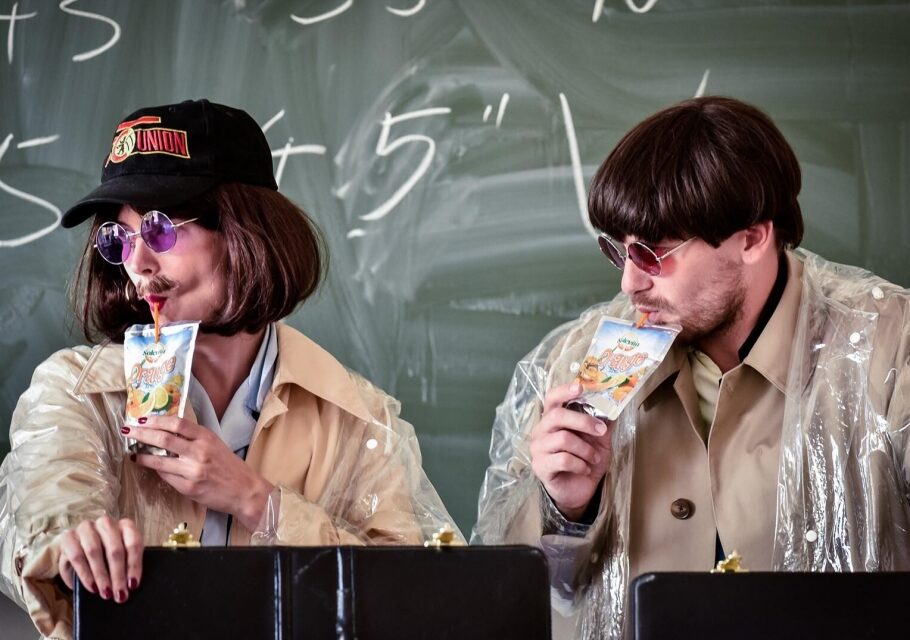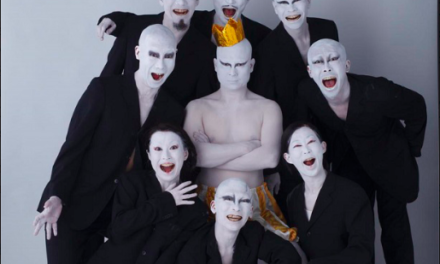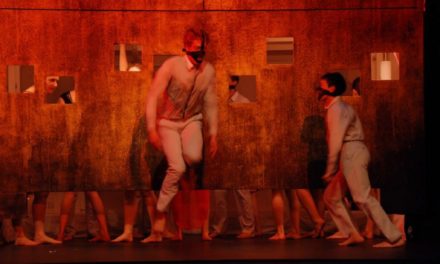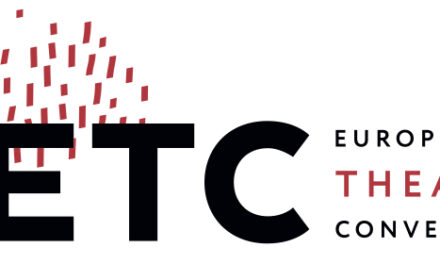Youth Theatre – Audience Development
A Conversation with the Youth Council of the Deutsches Theater Berlin
Productions and theatre projects with young people are staged every season at the Deutsches Theater Berlin (Germany). That’s why Junges DT (Young DT) formed a Youth Council to represent the interests of younger audiences and advise the youth division of Deutsches Theater Berlin on its season planning.
Fifteen young people make their entrance on the second largest stage of the Deutsches Theater—and are immediately struck by stage fright. The audience is waiting: Mom and Dad, Grandma and Grandpa, even aunts are in attendance. Along with a few school classes. People their own age! Now what? According to the playbill, they’re staging The Robbers by Friedrich Schiller! Angrily, the young performers face their audience:
“Okay, hands on your heart: Who honestly believes that we can perform something like Schiller? Admit it, while you were waiting in the foyer just now did you think: ‘Geez, I hope they don’t mess this one up?’ Fuck you! We’re the same age Schiller was when he wrote The Robbers! ‘Oh! Young people are performing in The Robbers, so I can visit it with my school class and take an exam on it.’ Fuck you! ‘Hopefully the play will mention Greta Thunberg and #metoo, the food industry, cruises, bullying, gentrification.’ Fuck you!”, the performers on stage shout, with raised middle fingers.
In Joanna Praml’s production of The Robbers, performers between the age of fourteen and twenty years old examine the themes raised in the Schiller classic, while also questioning their desire to be on stage. In doing so, they become a band of outlaws, holding all German artistic directors hostage under the stage, thus pointing out how society demands that this generation do something, without believing they are capable.
Since 2009, the Junges DT has actively sought to foster a playful dialogue about art and the world we live in—in collaboration with young people between twelve and 22 years old. Here, younger points-of-view and energy encounter dramatic masterpieces as well as major issues as they conquer theatrical stages with interdisciplinary formats and diverse ensembles. Particularly noteworthy are the professional repertory productions in which young people perform on stage—several times over the course of a month, not just for a one-time final presentation. For some productions, they even perform with the theatre’s professional ensemble. Other formats such as theatre clubs and holiday projects offer young people the chance to create new productions themselves and present their topics with the support of artists from the fields of theatre, performance, and dance.
These productions at a renowned German theatre are about more than just a hobby or ‘tricking’ teenagers into the theatre; instead, they offer a serious outlet for younger perspectives. All projects invite young people not only to watch, but also to create theatre. The youth council was founded in 2019 to uphold this mission and consists of six young performers from different productions and projects of the theatre. The council members are provided with a forum to propose changes and recommend what they would like to see on stage. They represent all young people performing at the Deutsches Theater, as well as a younger generation that loves the theatre, but also sees room for improvement.
In this interview, dramaturg Lasse Scheiba talked to five members of the youth council about their motivations for participating in theatre, why they think youth councils are a good thing and how they think theatres could become more attractive to younger audiences.
Eren: My name is Mustafa Eren Özdilberler and I am 17 years old. I joined the Young DT in 2017. I came to the theatre through projects at my school.
Rana: My name is Rana Tuzlali and I am 16 years old. I came to Deutsches Theater through a friend. I have been acting here since 2015.
Emil: My name is Emil Kollmann. I came to this theatre through my mother and I have been here since 2013. I am 18 years old.
Leni: Hello, my name is Leni von der Waydbrink, I’m 19 years old and I have been performing here since 2018.
Frida: I am Frida, I’m 17 years old and my first project at the Junges DT was staged last year. 2018.
The final member is Jasmin Fifassi Sebastiani, 20 years old and a member of the Junges DT since 2018, who could not be here today. You all perform in projects and shows here. Why the theatre? Why not another hobby?
Leni: For starters, I think it’s better to go see a performance instead of lying around on the couch. And on the other hand, I really enjoy acting and it gives me a lot. I always rediscover myself while acting and can try out different identities. But the coolest thing about it is the community that it creates. That you can come here and say, “Look, that’s Richi from the audio department, and that’s Lasse from dramaturgy.” You know, the people who seem ‘larger than life.’ I think it’s awesome to say that I’m a part of it all.
Rana: In every rehearsal process you learn so much about yourself and how to work with other people. Everyone has a different reason to do theatre, but I come here to be more myself. In the theatre I can show my identity from a variety of perspectives. I’m just much more open here.
Leni: It offers such therapeutic aspects. And it creates a feeling of family. We can talk to each other openly here.
Emil: I have been acting at the Junges DT for nine years now, and it has always been a refuge for me. It still is. On the one hand, when I watch theatre, and become engrossed like I never am at the movies, it’s as though I am immersed in a dream world. On the other hand, the people I have met here are very important to me. And I like being on stage, because I don’t have to be myself for 90 minutes. And at the same time, when I perform I can let out emotions that you can’t always show in everyday life.
In addition to acting, you’re also members of the Youth Council. Can you tell me more about the Youth Council?
Frida: We meet once a month and sit together with Lasse, the dramaturge of Junges DT. He always asks us a lot of questions about topics discussed in the Junges DT team. It’s a great feeling that they want to hear our opinion, and that we are listened to on equal terms. We advise the Junges DT and the theatre as young people. We are asked to share our thoughts on the season’s theme. We read plays that could be performed and say whether we are interested in them. We watch the premieres and share our opinions, for example if we would recommend them to other young people or if they are even suitable for school classes. I also find the representation for which the Youth Council stands very important: We are the Junges DT and we are more than different ensembles and projects, but a large group of theatre-loving young people!
Emil: Part of our job is to advocate for young performers. We make sure that everyone feels treated fairly and has access to the same opportunities. I also consider ourselves mediators. For example, I brought up the fact that there is no food and drink allowance for long rehearsals. That could be a problem because not everyone can afford lunch when we rehearse all day on the weekend. And now there are discussions at the Junges DT about whether a catering fund could be established. They didn’t have anything like that on the agenda before.
What are your personal goals for the Youth Council? What do you want to achieve?
Rana: I believe it is just a good system to have a say, to make suggestions and to involve the young people more—in other words, that we are on an equal level.
Leni: My goal is to heighten our visibility at the theatre, both within and without, and say: “We have a space here and we use it, we use it to the fullest extent possible and you can’t do anything about it, we are here now! So, deal with it.”
Frida: I think visibility is very important, but my goal is to get young people into the theatre, to show them how great it is. I would also like to give feedback to the theatre. That can be a very big step towards making it more accessible for larger groups of young people. We as young audiences should say what works for us and what doesn’t.
Emil: What attracted me was the opportunity to help plan the new season.
Eren: I want to protect the space that I love so much in theatre. To preserve the kind of protective dome that theatre is for many young people, especially those who are outside of the mainstream and don’t want to conform to society.
Theatres or theatre critics like to complain or wonder about the fact that young people supposedly no longer come to the theatre. Do you agree with this assessment? And if so, how do you think this could be changed?
Leni: I think that access to theatre as a young person is still quite limited. It depends on many different factors, such as money. Nine Euro for a theatre ticket is still a lot of money… Theatre is not only for old, white, 60 year olds who can afford the 60 Euro tickets in the first row!
Rana: I think it is important to show to the public that young people are interested in theatre and not only adults. They exist—the theatre-loving youth!
Eren: Maybe, but we can’t say that young people are interested in theatre in general. That’s simply not the case. It’s another world for the people I know from school. I grew up in Berlin’s Kreuzberg district and my only encounter with theatre came through school. I can certainly say that very few young people in my environment are interested in theatre.
Emil: I actually see many young people in the audience of the Deutsches Theater. Even though there is still a lot to do.
Rana: Yes, but not as young as we are. I would say it’s due to the image of theatre. Many people think it’s Romeo and Juliet, and the actors wear wigs and deliver monologues, and at the end everyone claps.
Eren: It’s a global problem that people aren’t interested in theatre. I think young people generally have fewer leisure activities. Instead, everyone just watches Netflix: ‘Netflix and chill.’
Frida: Maybe we need ‘theatre and chill?!’
(Everyone laughs)
Let’s say the management of a theatre were to call and ask: Dear Youth Council, what can we do to bring more young people into our theatre?
Frida: Many people think that the old plays are boring and the modern plays are hard to understand. And often I feel the same, to be honest. You sit in the auditorium as a young person and you know that they’re talking about something important and political, but you don’t really understand it. I don’t want to experience something like that, because it makes me feel apolitical and stupid. That’s why theatres should also produce plays that are really intended for younger audiences. When I see plays at the Junges DT, the people on stage have problems that I can relate to. But if you see a performance that is boring or you can’t understand, it’s obvious that you think afterwards: ‘I’m not doing that again, what a waste of time!’
Eren: Yeah, I think it would actually make a difference to do more performances that are fun! I didn’t grow up with theatre and I had this stereotypical image that it’s boring—a few actors stand in front, babbling on and on and you don’t understand a thing… And that cliché was often confirmed for me, at least until I saw so many performances that it was no longer confirmed.
Emil: I find classroom plays important, which the Junges DT offers, and that are performed in schools. I am fortunate to come from a family that is very interested in theatre, but I believe that many people whose families don’t have that interest simply don’t go to the theatre, and never change their negative image of it. Once they have a positive experience, it triggers something: I can go to the theatre and it might be really cool.
Leni: The four most important factors for me would be accessibility (in terms of ticket prices, for example), diversity in the ensemble and program, artistic freedom, and understanding for people who say: “I want to understand what’s happening and have fun doing it.” These are the things that bring me to the theatre again and again. Especially when the ensemble lacks diversity, it quickly makes people feel excluded. So it’s about showing everyone: “No matter where you come from or where your parents came from, our theatre is open to everyone.” That is the accessibility I would like to see at every theatre. I believe that the Junges DT sets a good example. You feel welcome here and the people who are a part of it are very diverse.
Emil: Projects with young people and a youth advisory board are a good start. This has a real impact on the audience, schools, parents and young people in the city, as everyone can see that this theatre takes the youth seriously. That young people have a say.
This article was originally published by the European Theatre Convention (https://www.europeantheatre.eu) as part of Youth Theatre: A Casebook. Reposted with permission. Read the original article.
This post was written by the author in their personal capacity.The opinions expressed in this article are the author’s own and do not reflect the view of The Theatre Times, their staff or collaborators.
This post was written by Lasse Scheiba.
The views expressed here belong to the author and do not necessarily reflect our views and opinions.


















